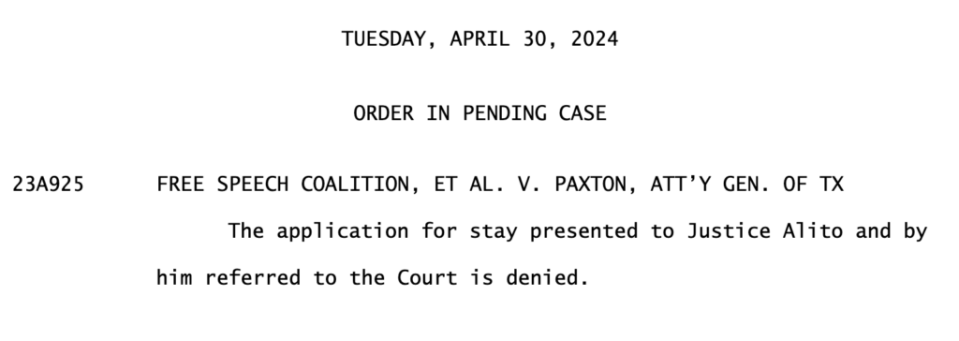Supreme Court Won't Stop Texas Porn Law From Taking Effect

The Supreme Court won't intervene to stop an anti-porn law from taking effect in Texas.
The law—H.B. 1181—pertains to websites publishing "sexual material harmful to minors," a category defined to include virtually all depictions of nudity or sexual activity. Sites where more than one-third of the material falls into this category must make visitors provide government-issued identification or verify visitor ages in some other way.
Under H.B. 1181, such platforms must also display a litany of absurd and unscientific messages. These include telling visitors—in 14-point font or larger—that porn can be "biologically addictive," that it's "proven to harm human brain development," and that it "weakens brain function." Such sites must also tell visitors that exposure to porn "is associated with low self-esteem and body image, eating disorders, impaired brain development, and other emotional and mental illnesses," and that "pornography increases the demand for prostitution, child exploitation, and child pornography."
Compelled Speech and Court Rulings
Unsurprisingly, adult-industry trade group the Free Speech Coalition (FSC) and Pornhub's parent company sued over the law. And a day before it was scheduled to take effect last fall, a U.S. district court put a halt to enforcement.
But the U.S. Court of Appeals for the 5th Circuit then reversed course. (And Texas Attorney General Ken Paxton has since started enforcing it.)
The 5th Circuit ultimately kept the lower court's injunction on enforcing the public health warning portion of the law but vacated the injunction against the age verification mandate.
"The district court properly…ruled that H.B. 1181 unconstitutionally compelled plaintiffs' speech," held the 5th Circuit in an opinion authored by Judge Jerry E. Smith. But "the age-verification requirement does not violate the First Amendment….So, the district court erred by enjoining the age-verification requirement."
In April, the Free Speech Coalition asked the Supreme Court to take up the case, and to issue a stay of the 5th Circuit's judgment in the meantime.
Yesterday, the Supreme Court denied the stay request.
"No reason was given. No justices noted their dissent or even issued a statement respecting or concurring with the denial to explain the basis for the action," noted Law Dork's Chris Geidner. "And yet, the silence spoke volumes about the freedom that the Fifth Circuit has to ignore Supreme Court precedent when it wishes."

Ignoring Porn-Law Precedent
Supreme Court precedent should prohibit the Texas age-verification law, argues Geidner.
In the 2004 ruling Ashcroft v. ACLU (known as Ashcroft II), the Court considered the Child Online Protection Act (COPA), which criminalized websites publishing content "harmful to minors" but provided an affirmative defense for platforms that took steps (like requiring a credit card) to verify that visitors were adults. Applying the legal standard known as strict scrutiny, SCOTUS decided COPA was not narrowly tailored enough to pass constitutional muster.
In the 5th Circuit's recent ruling on the Texas law, Smith noted the Court's Ashcroft decision—but dismissed it. "Though Ashcroft II concluded that COPA would fail strict scrutiny, it contains startling omissions," writes Smith, concluding that the Supreme Court "did not rule on the appropriate tier of scrutiny for COPA."
In other words, the 5th Circuit basically decided the Supreme Court was wrong and so it would ignore its precedent here.
And in declining to issue a stay of the 5th Circuit's ruling, the Supreme Court seems to be OK with this. It's wild.
Of course, this isn't the first time in recent years that the Court has allowed a very constitutionally questionable Texas law to take effect rather than pressing pause as the full case played out. But at least in the other cases, the Court attempted justification.
More from Geidner:
Back in 2021 when the Supreme Court allowed Texas's S.B. 8 vigilante enforcement six-week abortion ban to go into effect, the court twisted itself in knots to claim that the particulars of the law ("complex and novel antecedent procedural questions") made the high court's intervention at that stage in the litigation too questionable.
When the Supreme Court briefly allowed Texas's S.B. 4 immigration criminal enforcement law to go into effect earlier this year, some members of the court claimed procedural peculiarities counseled restraint from the high court to allow the Fifth Circuit to act ("an exercise of its docket management authority," Justice Amy Coney Barrett, joined by Justice Brett Kavanaugh, wrote).
In the current case, however, the high Court didn't offer a reason for its refusal to stay enforcement.
"Likely because a law regulating porn was at issue," writes Geidner, "the Supreme Court decided it didn't even need to put up the pretense of an excuse for allowing the Fifth Circuit to proceed with a ruling that explicitly disclaimed adherence to Supreme Court precedent."
What's Next for H.B. 1181?
There's still a chance that the Supreme Court could step in here. The Free Speech Coalition's petition for a full merits review by the Court is still pending.
"We look forward to continuing this challenge, and others like it, in the federal courts," the Free Speech Coalition commented. "The ruling by the Fifth Circuit remains in direct opposition to decades of Supreme Court precedent, and we remain hopeful that the Supreme Court will grant our petition for certiorari and reaffirm its lengthy line of cases applying strict scrutiny to content-based restrictions on speech like those in the Texas statute we've challenged. We will continue to fight for the right to access the internet without intrusive government oversight."
Meanwhile, Texas has sued Pornhub's parent company and other adult websites, alleging that they are failing to comply with the age verification component of the law.
More Sex & Tech News
• An "abortion trafficking" bill passed by the Tennessee Legislature "harms young people's ability to access the support of those they trust when they need it most and is an unprecedented attack on the First Amendment right to free speech and expression," according to American Civil Liberties Union of Tennessee Policy Director Bryan Davidson.
• A divorce case in Virginia is drudging up a debate about whether embryos can count as "property."
• The U.S. Court of Appeals for the 5th Circuit on Monday heard oral arguments in a case concerning Texas A&M University canceling drag performances."Whether it's a drag show, a political debate, or a Bible study, public university officials cannot silence protected expression based on their personal views," said J.T. Morris, a senior attorney with the Foundation for Individual Rights and Expression (FIRE), in an emailed statement.
• A piece of paper scribbled with "Buy Bitcoin" sold for $1 million in an auction. Christian Langalis—then an intern at the Cato Institute—held the note up behind then-Federal Reserve chair Janet Yellen during a 2017 Congressional hearing.
Today's Image

The post Supreme Court Won't Stop Texas Porn Law From Taking Effect appeared first on Reason.com.

